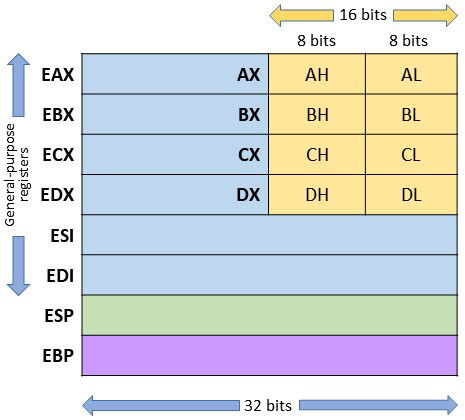Chapter 9 -
Data Movement
9.1 Move (mov)
|
The mov command transfers a byte, word, or dword from the 2nd operand to the 1st
operand. It can transfer data between two registers, between a register
and memory, but not from memory to memory. It can also be used to load an
immediate value into a register or memory. Below are some examples.
|
Command |
Description |
| mov eax, ebx |
Move the 4 bytes in ebx to eax |
| mov eax, A |
Move memory address of variable A to
eax |
| mov eax, [A] |
Move value at memory address A into eax |
| mov ecx, 1234 |
Move immediate value 1234 to ecx |
| mov [A], 73 |
Move immediate value 73 to memory at A |
mov eax, A
mov dword [eax], 73 |
Move memory address of A to eax.
Move 73 to memory in eax. [A] is now equal to 73. |
| mov cl, dl |
Move the byte at dl into cl |
| mov eax, [ecx+4] |
Move 4 bytes at memory address ecx+4 to
eax |
| mov [ecx], 1234 |
Movie immediate value 1234 to memory
address at [ecx] |
mov eax, 0
mov ebx, 0xffff
mov al, bl |
Move the byte with bl to al.
Register eax is now equal to 0xff (255). |
|
 |
9.2 Size Directives
The intended size of the of the data at a given memory address
can usually be inferred from the assembly code instruction. For example:
mov [eax], A ;if A is declared as a dd, then it will move 32 bits at
[A] into eax
If the size of the data is ambiguous such as with immediate values, you must use
a size directive. For example:
mov dword [eax], 73 ;it is not
known if 73 should be stored in 1, 2, or 4 bytes so dword is used
Size directives
are also necessary in printf commands.
cinvoke printf,"%d", A
;since variables have a size the directive is not needed
cinvoke printf,"%d", dword [ecx]
;the size of the data at memory address [ecx] is not known
|
Directive |
Size |
Example |
| byte |
1 byte |
mov byte [eax], 73
;move 73 into byte at [eax] |
| word |
2 bytes |
mov word [eax], 73
;move 73 into 2 bytes at [eax] |
| dword |
4 bytes |
mov dword [eax], 73
;move 73 into 4 bytes at [eax] |
9.3 Memory Offets
The program below demonstrates how memory
offsets can be used. Each of the three variable A,B,C are stored in
consecutive memory. Since they store 4 byte values, you can use [A+4] to
reference the value in [B].
|
offset.asm |
format PE console
include 'win32ax.inc'
;=======================================
section '.code' code readable executable
;=======================================
start:
cinvoke printf,"Value is %d %c", [A], 10
cinvoke printf,"Value is %d %c", [A+4], 10
cinvoke printf,"Value is %d %c", [A+8], 10
invoke Sleep,-1
;======================================
section '.data' data readable writeable
;======================================
A dd 33
B dd 44
C dd 55
;====================================
section '.idata' import data readable
;====================================
library msvcrt,'msvcrt.dll',kernel32,'kernel32.dll'
import msvcrt,printf,'printf'
import kernel32,Sleep,'Sleep'
|
|
Output |
Value is 33
Value is 44
Value is 55 |
9.3 Exchange (xchg)
Use xchg to exchange two operands. Here are some
examples:
xchg eax, ebx ;swap
the contents of registers eax and ebx
xchg eax, [A] ;swap contents of eax and variable A
